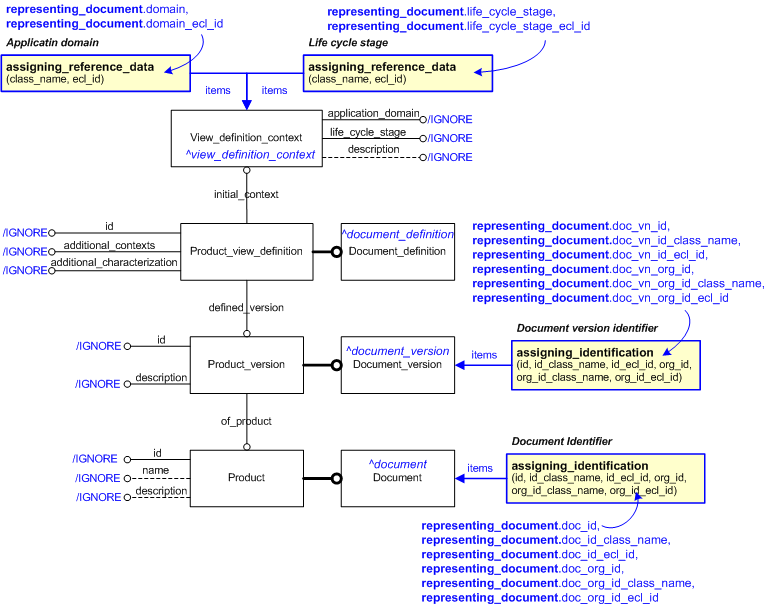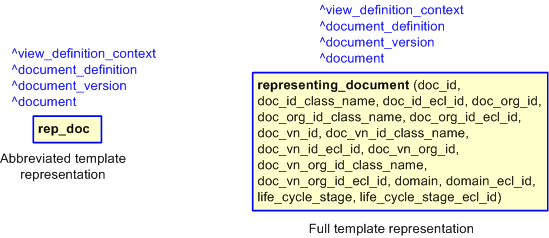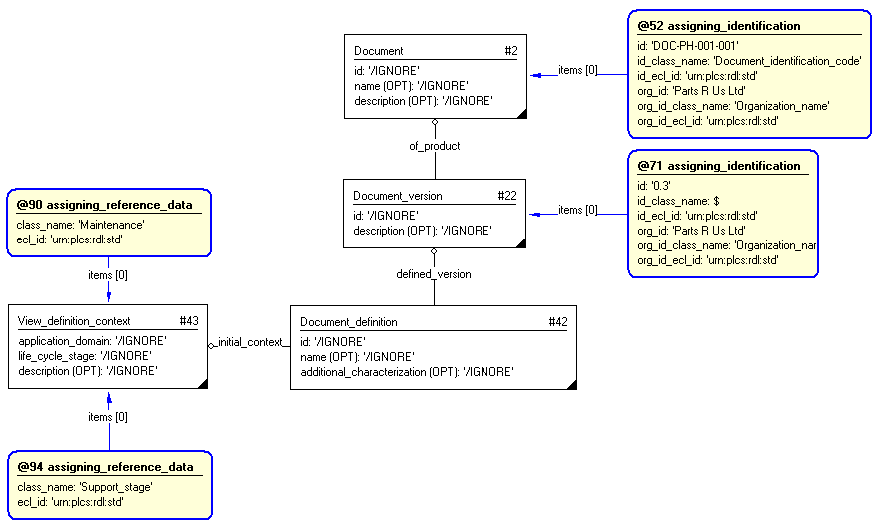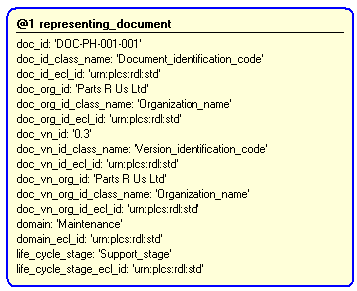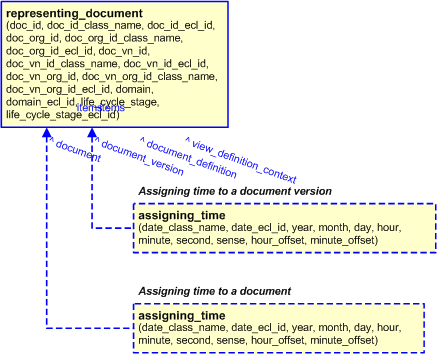| Template:— representing_document (rep_doc) |
Date: 2008/03/06 14:03:46
Revision: 1.17
|
This section specifies the template representing_document.
NOTE
An explanation of a template and the associated instantiation path is
provided in the
Template overview
section.
This template describes how to represent a
Document.
The EXPRESS-G diagram in
Figure
1
shows the templates and EXPRESS entities that are required
to represent the template
"representing_document".
The text highlighted in blue shows the template parameters.
Figure 1 — An EXPRESS-G representation of the Information model for representing_document
The graphic for the template to be used in other EXPRESS-G diagrams
is shown in Figure
2
below.
Figure 2 — The graphical representation of the representing_document template
The following input parameters are defined for this template:
The following classes and their sub-classes can be used:
The identifier of the
External_class_library
storing the definition of the class referenced by the parameter @doc_id_class_name.
The name or identifier of the
Organization owning the document identifier or name @doc_id.
The following classes and their sub-classes can be used:
The identifier of the document version.
The following classes and their sub-classes can be used:
The identifier of the
External_class_library
storing the definition of the class referenced by the parameter @doc_vn_id_class_name.
The name or identifier of the
Organization owning the document version identifier or name @doc_vn_id.
The following classes and their sub-classes can be used:
domain (Default=Product_life_cycle_support,Type='CLASS', Optional)
The following classes and their sub-classes can be used:
The identifier of the
External_class_library
storing the definition of the class referenced by the parameter @domain class.
The following classes and their sub-classes can be used:
The identifier of the
External_class_library
storing the definition of the class referenced by the parameter @life_cycle_stage class.
The following reference parameters are defined for this template:
Allow the
Document
entity instantiated in this path to be referenced when this template is used.
Note: The
Document
entity can be referenced in a template path by:
%^target = $representing_document.document%
where
target
is the parameter to which the
Document
is bound.
Allow the
Document_version
entity instantiated in this path to be referenced when this template is used.
%^target = $representing_document.document_version%
Allow the
Document_definition
entity instantiated in this path to be referenced when this template is used.
%^target = $representing_document.document_definition%
%^target = $representing_document.view_definition_context%
The following parameter combinations specify a uniqueness constraint:
Unique constraint: Unique document
Unique constraint: Unique document definition
Each instance of the
entity
(
Document_definition)
within the data set shall be uniquely identified
by a combination of the following parameters on this
template (representing_document) namely:
doc_id,
doc_id_class_name,
doc_id_ecl_id,
doc_org_id,
doc_org_id_class_name,
doc_org_id_ecl_id,
doc_vn_id,
doc_vn_id_class_name,
doc_vn_id_ecl_id,
doc_vn_org_id,
doc_vn_org_id_class_name,
doc_vn_org_id_ecl_id,
domain,
domain_ecl_id,
life_cycle_stage,
life_cycle_stage_ecl_id.
The
instance is
referenced by the following template parameter:
document_definition.
Unique constraint: Unique document version
Each instance of the
entity
(
Document_version)
within the data set shall be uniquely identified
by a combination of the following parameters on this
template (representing_document) namely:
doc_id,
doc_id_class_name,
doc_id_ecl_id,
doc_org_id,
doc_org_id_class_name,
doc_org_id_ecl_id,
doc_vn_id,
doc_vn_id_class_name,
doc_vn_id_ecl_id,
doc_vn_org_id,
doc_vn_org_id_class_name,
doc_vn_org_id_ecl_id.
The
instance is
referenced by the following template parameter:
document_version.
Unique constraint: Unique view_definition_context
The instantiation path shown below specifies the entities that are to be
instantiated by the template.
A description of templates and the syntax for the instantiation path is
provided in the
Templates Help/Information section.
-- Document Document-- Mark the Document entity as -- referable when this template is used by binding it to the reference -- parameter id_assgn %^document =
Document%
Document.id = '/IGNORE'
Document.name = '/IGNORE'
Document.description = '/IGNORE'
-- Identify the Document /
assigning_identification(
items=^document,
id=@doc_id,
id_class_name=@doc_id_class_name,
id_ecl_id=@doc_id_ecl_id,
org_id=@doc_org_id,
org_id_class_name=@doc_org_id_class_name,
org_id_ecl_id=@doc_org_id_ecl_id )/
-- Document version Document_version-- Mark the Document_version entity as -- referable when this template is used by binding it to the reference -- parameter ^document_version %^document_version =
Document_version%
Document_version.id = '/IGNORE'
Document_version.description = '/IGNORE'
-- Relate the document_version to the document Document_version.of_product ->
Document-- Identify the Document_version /
assigning_identification(
items=^document_version,
id=@doc_vn_id,
id_class_name=@doc_vn_id_class_name,
id_ecl_id=@doc_vn_id_ecl_id,
org_id=@doc_vn_org_id,
org_id_class_name=@doc_vn_org_id_class_name,
org_id_ecl_id=@doc_vn_org_id_ecl_id )/
-- Document_definition Document_definition-- Mark the Document_definition entity as -- referable when this template is used by binding it to the reference -- parameter ^document_definition %^document_definition =
Document_definition%
-- Set the Document_definition attributes Document_definition.id = '/IGNORE'
Document_definition.name = '/IGNORE'
Document_definition.additional_characterization = '/IGNORE'
-- Relate the document_version to the document Document_definition.defined_version ->
Document_version-- View_definition_context View_definition_context-- Mark the View_definition_context entity as -- referable when this template is used by binding it to the reference -- parameter ^view_definition_context %^view_definition_context =
View_definition_context%
-- Ignore the attributes View_definition_context.application_domain = '/IGNORE'
View_definition_context.life_cycle_stage = '/IGNORE'
View_definition_context.description = '/IGNORE'
-- provide the application domain of the view definition by classification /
assigning_reference_data(
items=^view_definition_context,
class_name=@life_cycle_stage,
ecl_id=@life_cycle_stage_ecl_id)/
-- provide the life cycle stage of the view definition by classification /
assigning_reference_data(
items=^view_definition_context,
class_name=@domain,
ecl_id=@domain_ecl_id)/
-- Relate the document_definition to the View_definition_context Document_definition.initial_context ->
View_definition_context
The following entities are instantiated with attributes as specified:
The instance diagram in Figure
3
shows an example of the EXPRESS entities and templates that are instantiated by the template:
/representing_document(doc_id='DOC-PH-001-001', doc_id_class_name='Document_identification_code', doc_id_ecl_id='urn:plcs:rdl:std', doc_org_id='Parts R Us Ltd', doc_org_id_class_name='Organization_name', doc_org_id_ecl_id='urn:plcs:rdl:std', doc_vn_id='0.3', doc_vn_id_class_name='Version_identification_code', doc_vn_id_ecl_id='urn:plcs:rdl:std', doc_vn_org_id='Parts R Us Ltd', doc_vn_org_id_class_name='Organization_name', doc_vn_org_id_ecl_id='urn:plcs:rdl:std', domain='Maintenance', domain_ecl_id='urn:plcs:rdl:std', life_cycle_stage='Support_stage', life_cycle_stage_ecl_id='urn:plcs:rdl:std')/
(an illustration of the consolidated representing_document template is shown in
Figure
4 below.)
Figure 3 — Entities instantiated by representing_document template
The instance diagram in
Figure
4
shows the graphic symbol for the template that is to be
used in other instance diagrams. The example template is:
/representing_document(doc_id='DOC-PH-001-001', doc_id_class_name='Document_identification_code', doc_id_ecl_id='urn:plcs:rdl:std', doc_org_id='Parts R Us Ltd', doc_org_id_class_name='Organization_name', doc_org_id_ecl_id='urn:plcs:rdl:std', doc_vn_id='0.3', doc_vn_id_class_name='Version_identification_code', doc_vn_id_ecl_id='urn:plcs:rdl:std', doc_vn_org_id='Parts R Us Ltd', doc_vn_org_id_class_name='Organization_name', doc_vn_org_id_ecl_id='urn:plcs:rdl:std', domain='Maintenance', domain_ecl_id='urn:plcs:rdl:std', life_cycle_stage='Support_stage', life_cycle_stage_ecl_id='urn:plcs:rdl:std')/
Figure 4 — Entities instantiated by representing_document template
The following section details how the
representing_document
template can be optionally characterized by assigning
other constructs to it. These are characterizations commonly
applied to the template. The ISO 10303-239 EXPRESS model may enable
other assignments to the entities instantiated by the template.
The following characterizations may apply:
Characterization Assigning time
NOTE this characterization is optional.
